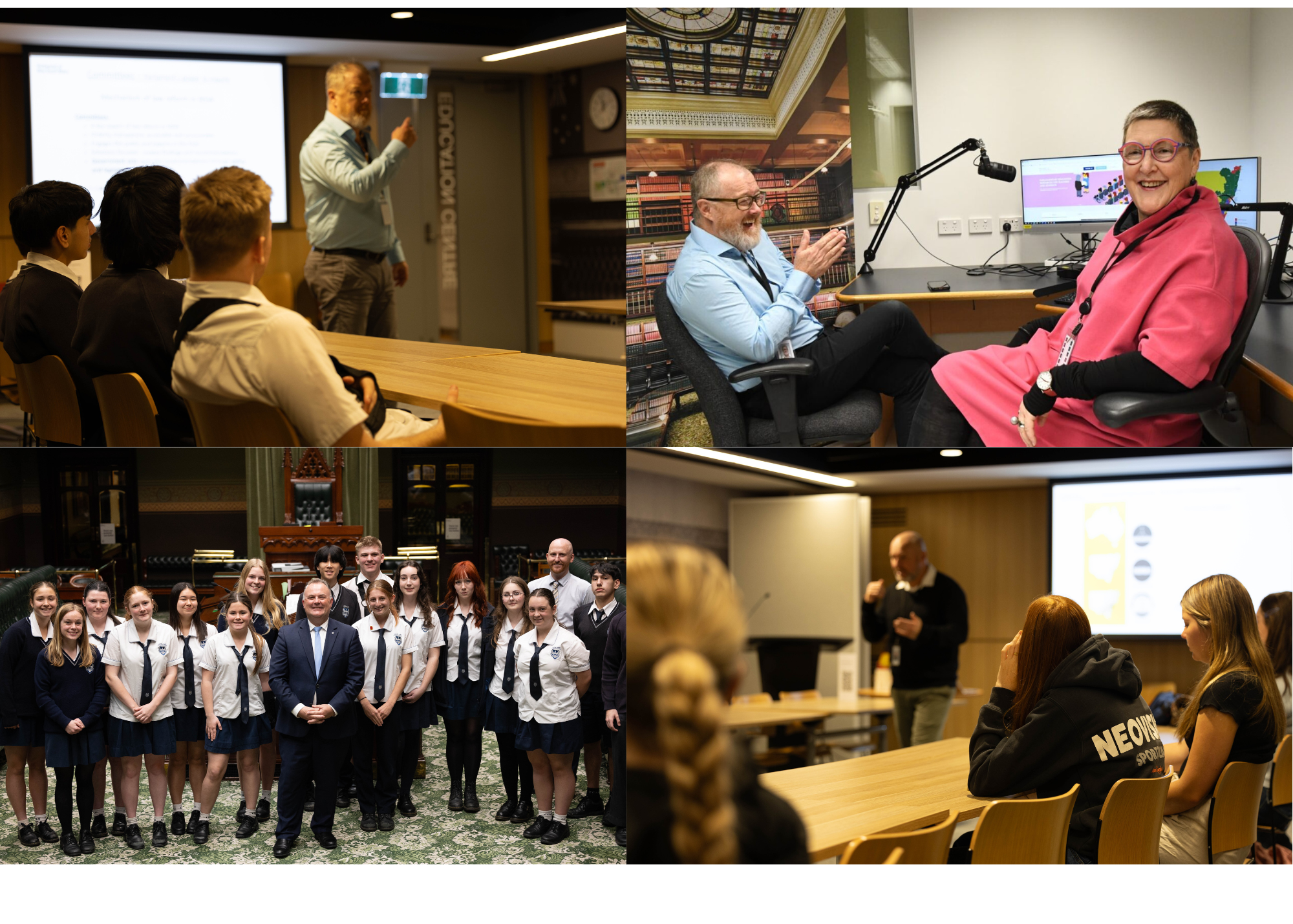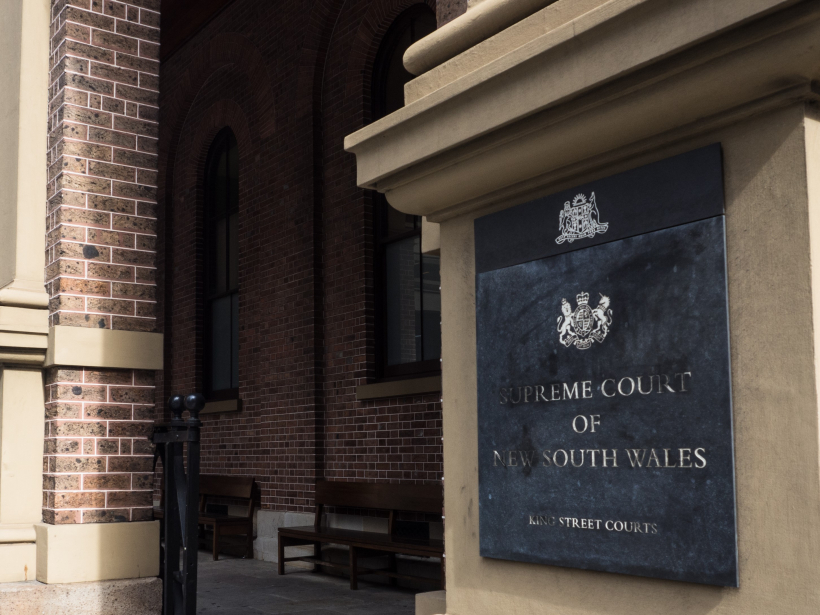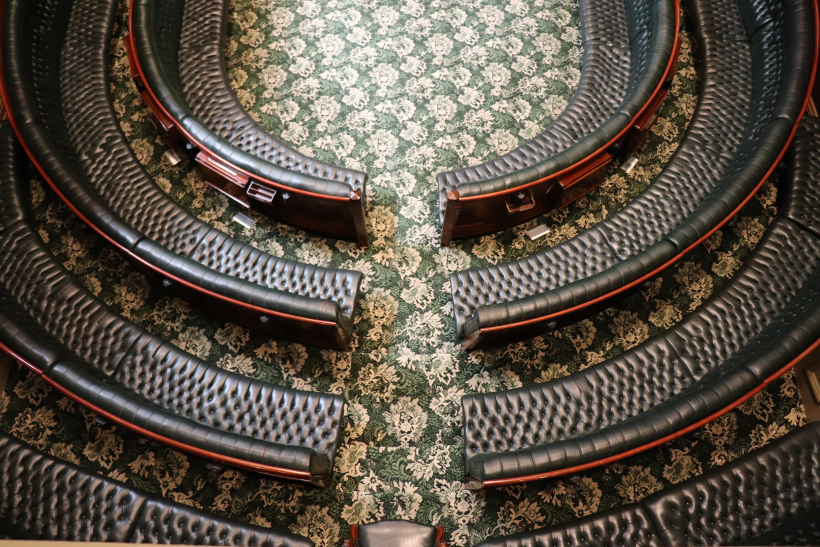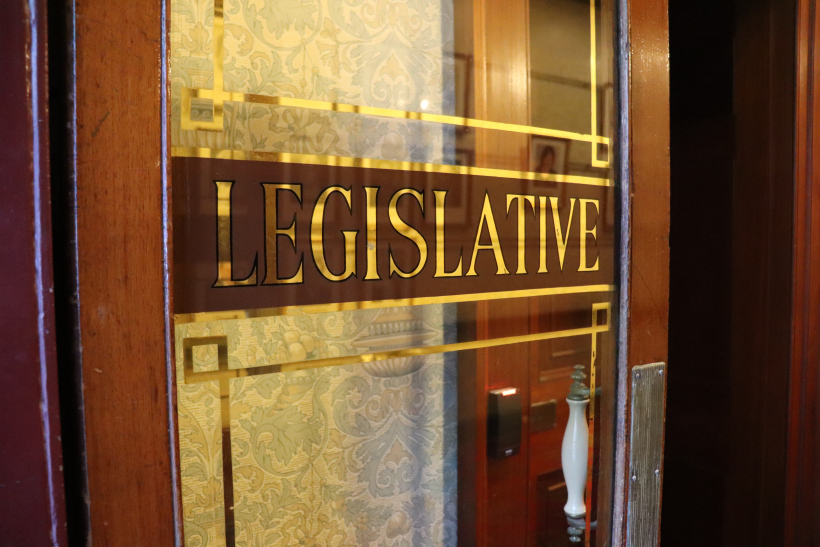Learning Outcomes
- Describe sources of contemporary Australian law - common law
- Understand how statute law is made including the structure of Parliament, the legislative process and delegated legislation
- Explain the division of powers in the Australian Constitution
- Explain the separation of powers in Australia’s system of government
- Explain the difference between the division and separation of powers in Australia
- Describe the role of parliamentary committees in law reform
- Describe the role of Members of Parliament in resolving disputes with the state
The Legal Studies and the Legislature programs at the Parliament of NSW are based on Part 1: The Legal System and Part II: The individual and the law of the Legal Studies Syllabus.
On a sitting day students participate in a workshop and visit the Legislative Assembly and Legislative Council Chambers, observing the Parliament in action and, where possible, meet their member.
On non-sitting days students participate in a 90-minute workshop and then a 30-minute tour of the chambers.
Additionally, a video conference is available via Teams or ZOOM at a time suitable to the teacher between 8:30 am and 2:30 pm, during the school term.
Maximum group size: 50; please see below for eligible dates and booking enquiry link.

Syllabus Links
Students who participate in Legal Studies and the Legislature will develop an understanding of the nature and functions of law through the examination of the law-making processes and institutions.
|
Part 1: The legal system |
Part 2: The individual and the law |
| 1. Basic legal concepts • Customs, rules and law • Rule of law • Anarchy • Tyranny |
1. Your rights and responsibilities • the nature of individual rights • relationship between rights and responsibilities |
| 2. Sources of contemporary Australian law Common law • British origins Statute law • role and structure of parliament • legislative process • delegated legislation The constitution • division of powers • separation of powers |
|
| 3. Classification of law | |
| 4. Law reform • conditions that give rise to law reform including changing social values, new concepts of justice • agencies of reform including parliamentary committees • mechanisms of reform including parliaments. Law reform in action (A) native title – Terra nullius (B) contemporary law reform issues. Bills and case studies from 2023 including • Anti-discrimination Amendment Bill • First Home Buyers Legislation Amendment Bill |
|
Objectives A student develops knowledge and understanding about: |
Preliminary course outcomes A student: |
|
1. the nature and institutions of domestic and international law |
P1. identifies and applies legal concepts and terminology |
|
2. the operation of Australian legal systems and the significance of the rule of law |
P3. describes the operation of domestic legal systems |
|
3. the interrelationship between law, justice and society and the changing nature of the law |
P6. explains the nature of the interrelationship between the legal system and society |
About This Program
Program options
| Program | Times | Content |
| Legal Studies and the Legislature on a sitting day. (Recommended) 120 mins |
Tuesday: 11:45am-1:45pm Wednesday & Thursday: 10 am – 12 pm |
Program presentation, observation of Question Time and chat with member (schedules allowing) |
| Legal Studies and the Legislature on a non-sitting day. (Subject to availability) 120 mins |
Monday and Friday: 9, 10 or 11 am Tuesday, Wednesday, and Thursday – 9, 10, 11 am, 12 or 1 pm |
Program presentation and short role play in each Chamber |
| Legal Studies and the Legislature Videoconference (Teams or ZOOM) 45-60 mins |
Teacher’s choice of time (between 8:30am-2:30pm) | Online program presentation |
How Can I Book?
Available sitting days 2025 when parliament is session. Please consult the Sitting Day Calendar (2025) for a complete list of dates.
During sitting weeks, Parliament sits on Tuesday, Wednesday, Thursday
|
Available Sitting dates for 2025 are: |
Question Time |
|||
|
Term 1 |
February 11, 12, 13 and 18, 19, 20 March 18, 19, 20 and 25, 26, 27 |
Legislative Assembly |
Legislative Council |
|
|
Term 2 |
May 6, 7, 8, (13,14,15 LA only) 27, 28, 29 June 3, 4, 5, and 24, 25, 26 |
Legislative Assembly and Legislative Council |
||
|
Term 3 |
August 5, 6, 7 September 9, 10, 11 and 16, 17, 18 |
|
|
|
|
Term 4 |
October 14, 15, 16 and 21, 22, 23 November 11, 12, 13 and 18, 19, 20 |
|
|
|
Bookings are essential.
- Please call us 0437 240 869 or
- Email us [email protected]
- Booking enquiry Legal 2025
- Regional, remote and rural schools (in electorates more than 120km from the Parliament of NSW) may be eligible for a travel subsidy. Click here to check your eligibility.




